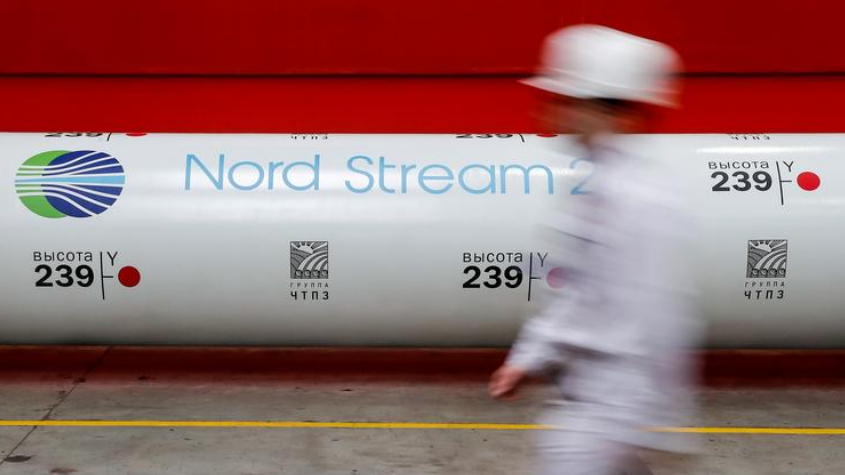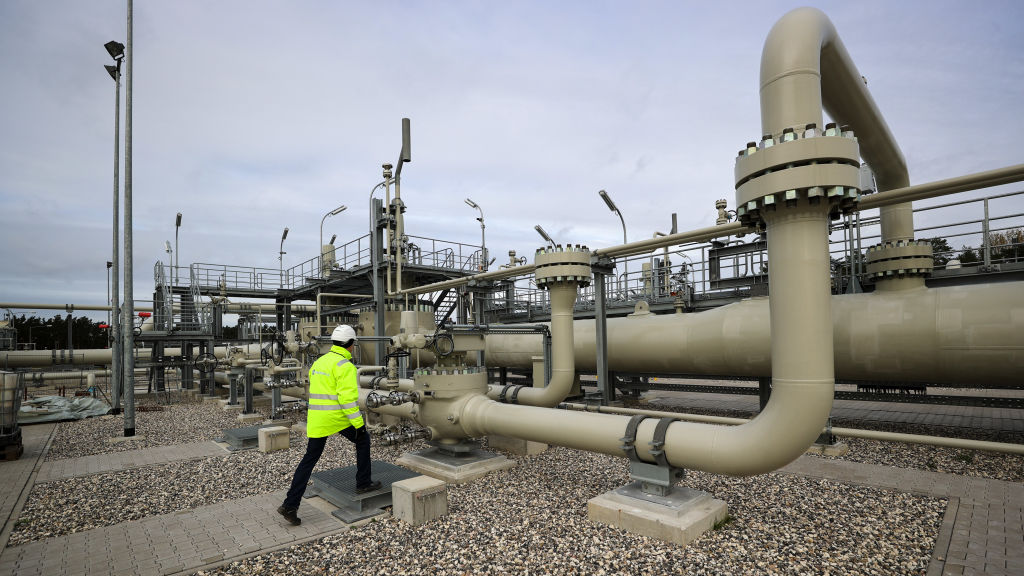
The logo of the Nord Stream 2 gas pipeline project is seen on a large diameter pipe at Chelyabinsk Pipe Rolling Plant in Chelyabinsk, Russia, February 26, 2020. /Reuters
The logo of the Nord Stream 2 gas pipeline project is seen on a large diameter pipe at Chelyabinsk Pipe Rolling Plant in Chelyabinsk, Russia, February 26, 2020. /Reuters
Editor's note: Djoomart Otorbaev is the former Prime Minister of the Kyrgyz Republic, a distinguished professor of the Belt and Road School of Beijing Normal University, and a member of Nizami Ganjavi International Center. The article reflects the author's views, and not necessarily those of CGTN.
The development of the Nord Stream 2 project looks like a real political thriller. During both the planning and construction of this gas pipeline, all the qualities of hybrid warfare were demonstrated. Among which are intrigues, ultimatums, pressure, blackmail, threats, aggressive attacks, and stubborn defense. All this took place before our eyes, and, paradoxically, between strategic partners - the EU and the U.S.
The fights were about the 1,230-kilometer underwater pipeline, through which natural gas is to be transported along the bottom of the Baltic Sea from Russia to northern Germany. The $11 billion project, which is 95 percent complete, will double the existing Nord Stream pipeline's capacity. Russian Gazprom will cover half of the planned project costs. The rest is shared by European companies - Royal Dutch Shell, Engie, OMV, Uniper, and Wintershall.
Washington has long opposed the Nord Stream 2 project, arguing that it will make Europe more dependent on Russian energy. Some Eastern European countries resisted as well, especially Ukraine, which will lose billions of dollars in transit fees upon completing the project.
Despite Europeans' demands to respect their economic interests and rights, the former Donald Trump administration has decided to act aggressively. For example, in December 2019, the U.S. imposed broad sanctions against the project's contractors, mainly European companies. As a result, the Swiss-Dutch company Allseas withdrew from the project, and pipe-laying was suspended for a whole year.
These restrictions forced several more project participants to abandon work on Nord Stream 2. In just the last month, the Swiss Zurich Insurance Group, the Norwegian certification organization Det Norske Veritas - Germanischer Lloyd (DNV GL), and the Dutch consulting group Ramboll have announced plans to withdraw from the project.
It becomes clear that purely political and selfish economic considerations were behind the actions of the U.S. administration. In my opinion, the pressure on the project from Washington had a few goals. To show to the world "who is the boss," to oblige Russia to pay Ukraine for the transit, to force the Europeans to buy American liquefied natural gas (LNG), and impose economic damage on Russia.
In this conflict, Germany's government took the most principled position for purely pragmatic reasons. It could receive cheap gas, and many European and German enterprises were involved in the contracts. Berlin has repeatedly announced its intention to complete the gas pipeline's construction, and the U.S. actions were called attempts to interfere in their internal affairs.

A worker inspects pipework at the Nord Stream 2 gas pipeline landing facility on the Baltic Sea coastline in Lubmin, Germany, November 5, 2020. /Getty
A worker inspects pipework at the Nord Stream 2 gas pipeline landing facility on the Baltic Sea coastline in Lubmin, Germany, November 5, 2020. /Getty
Recently, German media reported that Chancellor Angela Merkel's government tried to strike a deal with former President Donald Trump's administration to avoid sanctions and complete the pipeline. For the first time, the confidential talks between Berlin and Washington were reported by the newspaper Die Zeit in September 2020.
According to the claim, German Finance Minister Olaf Scholz offered Steven Mnuchin, his U.S. counterpart, to lift sanctions against the pipeline in exchange for billions of dollars in investments, which was denied by the German government.
More recently, the project has been threatened by deterioration in relations between the EU and Russia. However, European politicians quickly made it clear that new sanctions against Russia would not affect the completion of Nord Stream 2.
Finanzen.net quoted the German Foreign Minister Heiko Maas, who said that if the pipeline's construction is curtailed, it would push Russia and China ever closer together. "And I don't think that should be the strategy of the West." He opposes "tearing down all bridges" with Russia: "Not only is it wrong, but also dangerous."
Thus, there are no severe reasons left that could impede the completion of the gas pipeline. In anticipation of new sanctions from the West, following the imprisonment of Alexei Navalny and the arrest of thousands of Russians protesting his detention, the Kremlin received good news this month. On February 7, the consortium overseeing the project has announced that it has resumed pipe-laying at the last unfinished section in Danish waters.
It seems to me that mainly by inertia, Washington, under the new administration, continues to ask its European partners to stop construction, and Biden called the pipeline "a bad deal for Europe." However, his administration will likely no longer quarrel with Europeans and fight too aggressively to stop the project in its rapprochement policy with strategic allies. Europe was able to withstand the pressure and proved the right to sovereignty when making strategic economic decisions.
As stated in jurisprudence, precedent is the most critical element during the application of the common law. Americans, Europeans, and other "observers" have learned a good lesson for the future. Many have realized that the world policeman's role, which the U.S. has enjoyed for a long time, will gradually recede into the past. The unipolar world is slowly but surely ending.
(If you want to contribute and have specific expertise, please contact us at opinions@cgtn.com.)

